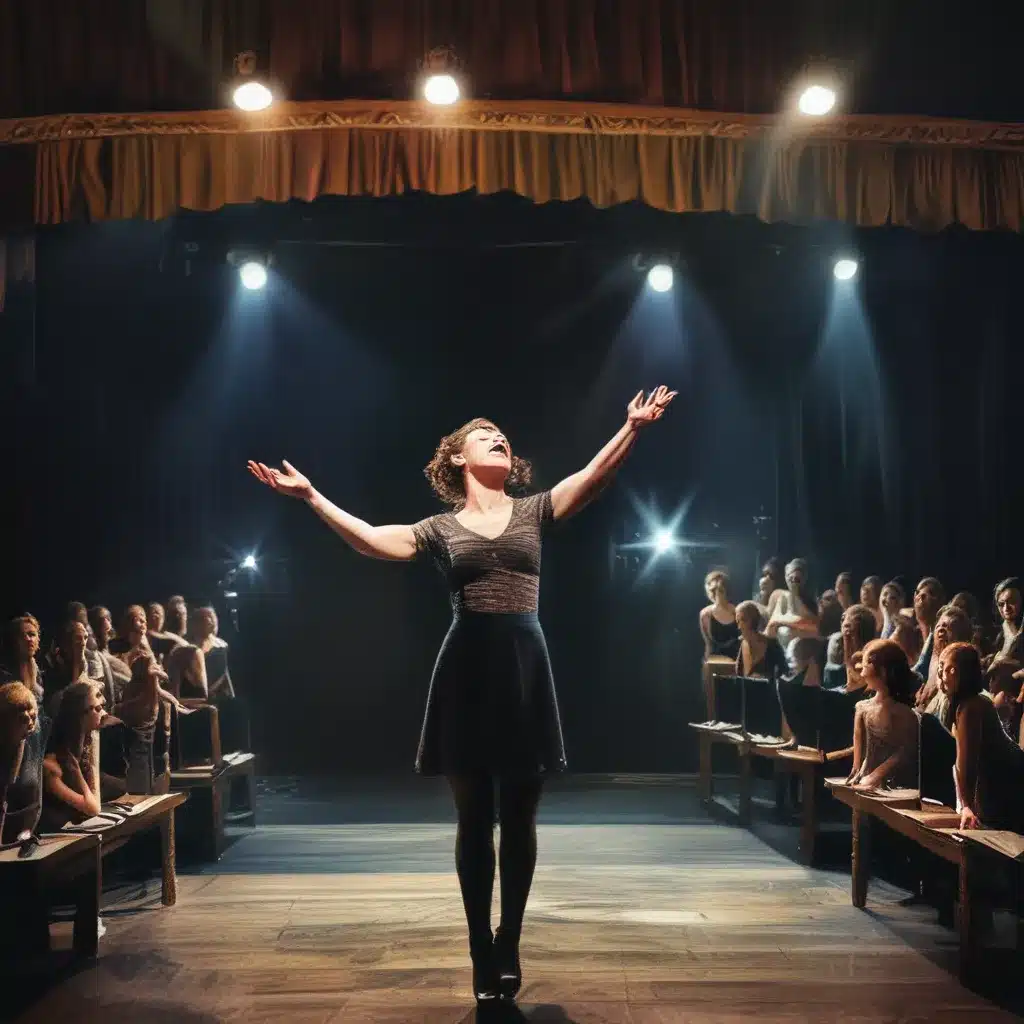
Unveiling the Curtain on Stage Fright
As a musical theater artist, I’ve had my fair share of experiences with that unwelcome visitor known as stage fright. It’s the shadow that looms over countless performances, from aspiring amateurs to seasoned professionals. But you know what? I’m here to tell you that it doesn’t have to be that way.
Stage fright, or performance anxiety, is a nearly universal phenomenon. It’s not just us newbies who struggle with it – even the greats have grappled with that heart-pounding, palm-sweating feeling before taking the stage. But the good news is, it’s a challenge we can overcome.
You see, stage fright is rooted in our evolutionary biology, that ancient fight-or-flight response that was wired into our ancestors to help them survive. Back in the day, that adrenaline rush helped them face down sabertooth tigers. Nowadays, it’s our brain’s way of reacting to the “threat” of performing in front of an audience. Except, well, the audience isn’t trying to eat us. They’re there to be moved, transported, and entertained by our art.
Reframing the Narrative: Stage Fright as an Asset
So how do we tame this primal beast and transform stage fright into stage confidence? It all starts with a shift in mindset. What if we could harness that adrenaline rush, that boundless energy, and channel it into our performance? Renowned performance psychologist Sian Beilock says it’s all about reframing – seeing that physiological response as an asset rather than a saboteur.
I’ve learned that the key is to be meticulous in your preparation. Rehearse until the performance feels like second nature, so you can focus on delivering an authentic, engaging show rather than worrying about potential mistakes. And develop those pre-show rituals that help you center and focus, whether it’s backstage yoga, deep breathing exercises, or visualization techniques.
But it’s not just about the individual prep work. Surrounding yourself with a supportive community of fellow artists, mentors, and coaches can make all the difference. No one understands the challenges of stage fright better than your peers, and their encouragement and practical advice can be invaluable.
Mastering the Physical and Emotional Aspects of Performance
Of course, stage fright isn’t just a mental game. It manifests in very real physical symptoms – the shaky hands, the quivering voice, the racing heart. But there are ways to manage those too.
Pay attention to your stance, your movement, and your use of the stage. Stand tall, keep your shoulders relaxed, and use the space intentionally. Controlled breathing techniques and muscle-tensing exercises can also help you maintain physical composure.
And remember, that adrenaline rush isn’t all bad. Radiohead’s Thom Yorke has even described it as a “beautifully chaotic state” that’s essential to his performances. It’s all about recognizing that those rapid heartbeats aren’t a sign of fear, but a reflection of your passion and your desire to connect with the audience.
Forging a Bond with the Audience
Speaking of the audience, they’re not just passive observers – they’re collaborators in your creative journey. Making that connection, that empathetic symphony of communication, can be a powerful antidote to stage fright.
It might seem daunting to seek solace in the very crowd that triggered your anxiety, but trust me, it works. Something as simple as exchanging glances with audience members or acknowledging their presence can instantly dilute that barrier of fear. And sharing anecdotes or stories behind the songs? That fosters a mutual fondness that benefits both performer and spectator.
Remember, the audience isn’t there to judge or critique – they’re there to be moved, transformed, and enlivened by your art. They’re your compassionate partners in this empathetic symphony, not detached observers. So embrace that connection, and let it be your guide as you step into the spotlight.
Embracing the Journey: A Lifetime of Growth
Conquering stage fright isn’t a one-time fix – it’s a journey, a lifelong process of learning, growth, and self-discovery. And you know what? I wouldn’t have it any other way.
Every performance is an opportunity to challenge ourselves, to push the boundaries of our comfort zones, and to forge deeper connections with our audience. And with each step, we grow a little stronger, a little more confident.
So the next time you find yourself backstage, take a deep breath, trust in your preparation, and remember the wise words of the renowned cellist Yo-Yo Ma: “The stage is a magical place where you can do things that you can’t do anywhere else.”
And who knows, maybe one day, that stage fright will morph into a delightful sense of anticipation, a thrilling charge of energy that fuels your performance and captivates your audience. After all, that’s what the magic of musical theater is all about – transforming the ordinary into the extraordinary, one electrifying moment at a time.

